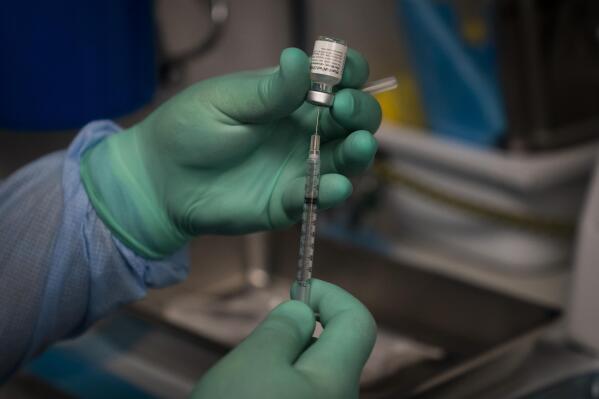A new study doesn’t show Pfizer’s COVID vaccine causes ‘VAIDS’

In this March 2021 photo provided by Pfizer, a technician inspects filled vials of the Pfizer-BioNTech COVID-19 vaccine at the company’s facility in Puurs, Belgium. (Pfizer via AP)
CLAIM: A new study by Australian researchers shows that Pfizer’s COVID-19 vaccine caused vaccine acquired immunodeficiency syndrome, or “VAIDS.”
AP’S ASSESSMENT: False. VAIDS is not a real condition, experts say. The co-authors of the study say their work is being misrepresented and doesn’t show that the vaccine is harmful to the immune system.
THE FACTS: As U.S. health officials recommend most Americans receive an updated COVID-19 vaccine, some online are re-airing false claims about the shots — with a new spin.
The social media posts claim that a new study proves the debunked notion that the vaccines cause a supposed condition called vaccine acquired immunodeficiency syndrome, or “VAIDS,” which experts have previously told The Associated Press isn’t a real condition.
“Pfizer’s COVID Vaccine Causes VAIDS in Children, Study Proves,” reads the headline of a widespread blog post.
A post on X, the platform formerly known as Twitter, sharing the blog post relayed a quote from it, claiming: “‘Finally, we have scientific confirmation that vaccination against COVID-19 causes a marked decrease in immunity to heterologous pathogens such as viruses, bacteria, and fungi.’ A condition known as ‘VAIDS’ vaccine-induced AIDS.”
The blog post references a study published in August in the journal Frontiers in Immunology, “BNT162b2 COVID-19 vaccination in children alters cytokine responses to heterologous pathogens and Toll-like receptor agonists.”
But that study’s findings are being misrepresented, the authors and an independent expert say.
Dr. Andrés Noé, a co-author of the study and researcher at the Murdoch Children’s Research Institute in Australia, pointed to a statement the authors published responding to such claims.
“It has been brought to our attention that our recently published study is being misinterpreted and misused to claim that COVID-19 vaccines are dangerous,” the statement reads. “Our research does not provide any evidence to suggest that COVID-19 vaccines are harmful to the immune system of children or adults. In particular, it is incorrect to suggest that our study results show that COVID-19 vaccines ‘suppress the immune system.’”
The study examined blood samples from children one month and six months after receiving a Pfizer vaccine and observed changes in what’s known as “cytokine production” by immune cells when encountering various pathogens, the authors explained.
They noted, however, that such responses “are only one facet of the body’s combined immune response and we do not know how long they last.” The study did not look at what the changes mean in the real world or determine whether they’re harmful or helpful.
Dr. Matthew Laurens, a pediatric infectious disease specialist and researcher at the University of Maryland School of Medicine’s Center for Vaccine Development who was not involved in the study, concurred that it doesn’t show the vaccine is dangerous or leading to immune system problems.
“On the contrary, they suggest that vaccination against SARS-CoV-2 may provide protection against other infectious diseases, something that would have to be examined in another study,” he said in an email. “These ‘off-target’ effects of vaccination are viewed as beneficial, not as a risk.”
Both Laurens and the study authors noted that similar, positive changes have been seen with the BCG vaccine — used in some parts of the world against tuberculosis — in which the immunization has been associated with potential protection against other illnesses.
Moreover, credible scientific studies support the benefit of COVID-19 vaccines, Laurens said, not the concept of “VAIDS.”
“VAIDS is something that simply does not exist,” Laurens said. “It is not found in the scientific literature. There is no evidence that COVID-19 vaccination leads to immunodeficiency.”
___
This is part of AP’s effort to address widely shared misinformation, including work with outside companies and organizations to add factual context to misleading content that is circulating online. Learn more about fact-checking at AP.


